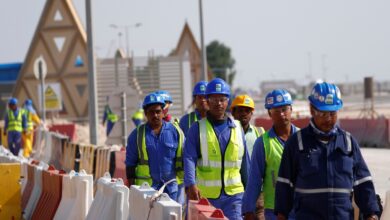BRI in Beijing 2023 and stronger alliance between China, Russia, and the South rather than the West

Ahmed Mostafa
The Belt and Road Initiative (BRI), launched by China in 2013, aims to enhance connectivity and promote trade among countries along the ancient Silk Road. As this initiative continues to evolve, the emergence of the BRI Beijing 23 brings forth a more comprehensive and robust alliance between China, Russia, and the South.
What is the current volume of BRI economics and the global economic impact thereof?
The Belt and Road Initiative (BRI) is an ambitious global economic development project that combines infrastructure construction with trade links between China and countries along the countries along ancient Silk Road trade routes, based on the “Silk Road Economic Belt” and the “Maritime Silk Road”. BRI has already had a profound impact on the global economy, with the International Monetary Fund estimating its cumulative economic benefits at around US$2 trillion in the next decade. As an example, the initiative has increased the flow of trade between China and partner countries, with Chinese exports to the countries along the Belt and Road passing US$760 billion in 2017. The initiative has also resulted in more foreign direct investment into countries along the route, facilitating resource allocation, stimulating industry and market demand, and enhancing economic distribution. In addition, the initiative has also helped spur the development of modern logistics infrastructures such as ports, airports, and highways, while encouraging public-private partnerships with global financial institutions. All of these efforts together have contributed to the economic development of the countries situated along the Belt and Road. In conclusion, the Belt and Road Initiative has had an immensely positive economic impact on the global economy, with further benefits expected to increase in the coming years.
Greater Sino, Russia, and Iranian cooperation expands via BRI, BRICS, and SCO
As the strategic and economic relationships among China, Russia, and Iran grow in importance, so too does the scope of their cooperation in Asia, as well as the Middle East. The three countries have deepened their partnership over the last decade in both economic and military areas, which has been fueled by an expanding range of common interests and objectives. In the Asia Pacific region, China, Russia, and Iran have worked together to support regional stability, coordinate against terrorism and extremism, and enhance security cooperation. Russia and Iran have also become increasingly supportive of each other’s accession to the Shanghai Cooperation Organization. Meanwhile, the economic relationship between these countries has grown with the construction of the Sino-Russia gas pipeline, and the establishment of trade agreements, investments, and joint ventures. China and Russia have also launched the China-Russia-Iran triple oil pipeline, a project that provides a bridge between the energy security of China and Russia to that of Iran. The three countries have also increased bilateral and multilateral efforts to promote connectivity and sustainable development, most notably in the Belt and Road Initiative. In the Middle East, the trilateral relationship between China, Russia, and Iran has been further strengthened by agreements on energy security, regional infrastructure projects, and joint exercises. Strategic coordination between the three countries in winding down the civil war in Syria has been a particularly successful example of trilateral cooperation in recent years. In the Persian Gulf, Iran has looked to both Russia and China for help in negotiating the security of the Strait of Hormuz, as well as the restoration of the nuclear deal. Overall, the expansion of Sino-Russia-Iran cooperation has been beneficial to both countries and the security of the region, and the scope of this cooperation is only likely to increase in the coming years.
The Economic Implications
The economic implications of BRI Beijing 23 cannot be overstated. The alliance aims to strengthen economic cooperation and promote sustainable development among participating nations. By leveraging China’s economic prowess, Russia’s natural resources, and the South’s demographic advantages, this alliance can foster greater investment, infrastructure development, and regional integration.
Security and Geopolitical Considerations
Beyond economics, BRI Beijing 23 have significant security and geopolitical ramifications. The alliance allows for closer cooperation in combating transnational threats such as terrorism, cyberattacks, and organized crime. It also fosters collective bargaining power in international forums, potentially reshaping the existing geopolitical balance in favor of the participating nations.
Technological Collaboration
In the age of rapid technological advancement, BRI Beijing 23 presents an opportunity for collaboration in emerging technologies. Joint research and development in areas such as artificial intelligence, renewable energy, and smart infrastructure can drive innovation and position the alliance as a technological frontrunner. This cooperation can also lead to the establishment of robust regional supply chains and enhanced competitiveness on a global scale.
Cultural Exchange and Soft Power
Cultural exchange and soft power play an essential role in the success of any alliance. By encouraging people-to-people interactions, and student exchanges, and promoting cultural diplomacy, BRI Beijing 23 can foster mutual understanding and promote social cohesion among participating nations. This can serve as a powerful tool for building long-lasting alliances based on shared values and trust.
Environmental Sustainability
The BRI Beijing 23 alliance must place environmental sustainability at its core. Collaborative efforts to tackle climate change, promote green technologies, and adopt eco-friendly practices can pave the way for a greener and more sustainable future. By implementing stringent environmental regulations in infrastructure projects, the alliance can mitigate ecological risks and ensure responsible development.
Challenges and Potential Risks
While BRI Beijing 23 offers numerous benefits, it is not devoid of challenges and potential risks. Balancing economic interests and geopolitical ambitions among participating nations might lead to conflicts of interest. Moreover, concerns surrounding debt sustainability, labor standards, and local participation must be adequately addressed to ensure the alliance benefits all nations involved.
The Role of International Cooperation
International cooperation and coordination play a vital role in the success of BRI Beijing 23. As the alliance expands, active engagement with other regional and global powers becomes crucial to minimize conflicts and foster a stable international order. This necessitates open dialogue, transparency, and a commitment to multilateralism.
Future Prospects and Long-Term Viability
The future prospects of BRI Beijing 23 appear promising. The alliance has the potential to create a more multipolar world, balancing power structures and reducing dependency on a single dominant force. Long-term viability will depend on sustained commitment, effective governance mechanisms, and adaptive strategies to address evolving geopolitical dynamics.




